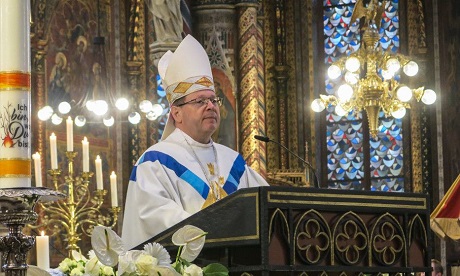Women’s ordination and married priests are still on the agenda for Germany’s new bishops’ conference leader, Bishop Georg Bätzing.
The new president says throughout the Church’s recent history, “different popes have explained and underlined that women’s access to the priesthood cannot be decided by the Church and Pope Francis is no exception.”
“In the Catholic Church the magisterium of the episcopal college cum Petro et sub Petro [with Peter and under Peter] is the decisive instance.
“But that does not mean that we cannot continue to talk about the issue of the ordination of women, because it is a question presented by the Church itself.”
The Church’s reasons for refusing women’s ordination “are no longer accepted” by large portions of the Catholic faithful, Bätzing notes.
Germany’s new bishops’ conference leader says he’s happy the conclusions of a two-year “synodal path” in Germany eventually will be sent to Rome, including their resolutions on women and the role of ministers.
“I believe that what is expressed synodally must also be clarified and a synodal answer be found, not simply the answer of a Roman dicastery! I am confident in this,” he said, adding, “This is the novelty which, with Pope Francis, has gained strength.”
Bätzing, who took over leading the German bishops’ conference from the often provocative Cardinal Reinhard Marx, is tasked with leading the German Church through the conclusion of its much-discussed “synodal path.”
The “synodal path” partly responds to a call to restore trust, after a September 2018 church-commissioned report detailed thousands of clerical sex abuse cases spanning 60 years.
The “synodal path” is a joint initiative of the Central Committee of German Catholics and the bishops’ conference.
Launched in November 2019, the two-year discussion is focusing on topics like the clergy sexual abuse crisis, the role of women in the church, married priests, the priesthood and clerical sexual abuse.
Speaking of the need for reform in the Catholic Church in Germany, Bätzing says the bishops launched their “synodal path” because “we want to question ourselves and look for what God has to tell us at this time, and how we can make our Church close to people and to the service of life.”
“Many topics are also urgent in other countries. So, we will bring our reflections to Rome.
“There will not be a special German process, since we understand ourselves as part of the universal Church just as we are a particular church for Rome. The one presupposes the other and vice versa.”
In relation to the debate about ordaining viri pobati, Bätzing points out says celibacy is a life “completely centered on God,”. However, “it does not seem to me that it would be harmful for the Church if there were also married priests,” he adds.
It would be “a great loss for the Church if there were only married priests and not those who choose celibacy for themselves,”.
Source
